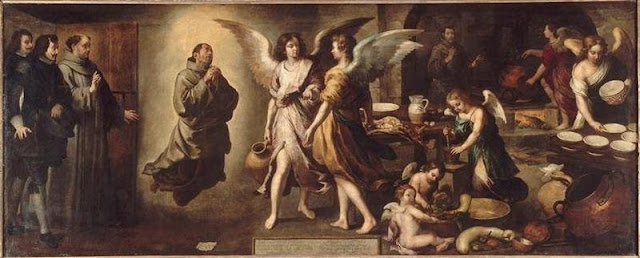 |
| Bartolomé Estebán Murillo The Angels' Kitchen 1646 oil on canvas Musée du Louvre |
Intersection of Styles
Realistic in his portraits of beggars, ethereal in his canvases of the Immaculate Conception, Murillo draws on his entire range of manners in this singular work. Realism is expressed by abundant still-life elements underlining the fact that we are in a kitchen, though it is also the site of mystical ecstasy – a Franciscan brother levitates in mid-air. According to legend, this monk while at work preparing a meal was uplifted by such emotion as he meditated that angels descended from Heaven to work in his place so that everything would be ready on time. Three men then enter the kitchen, stumbling upon this extraordinary scene, but are unable to perceive the angels.
Angelic Workers
These angels have wings, their normal attribute, yet also have their feet on the ground. Incarnate angels, they take on lowly jobs: fetching water, setting the table, grinding something in a mortar. Two cherubs, also clearly of flesh and blood, fat-bottomed as those by Rubens – robust little fellows – handle spices.
The devotee suspended above the floor, despite his ecstatic demeanor, remains entirely human and carnal; it clearly requires a genuine miracle to maintain him aloft. The food and cooking utensils give every evidence of providing for hearty appetites: a magnificent cauldron, a big haunch of meat, a substantial pitcher for the wine.
The Last Shall Be First
The angels descend and the brother rises. Associated with him are the generous but rustic objects we see, this peasant crockery which an angelic light reveals as beautiful. He is the lowest of the monks, but the first to be raised high in holiness. And he will be the one above who welcomes the powerful, if they prove able to clothe themselves in a humility equal to his.
– translated and adapted from Le Musée imaginaire de Michel Butor: 105 œuvres décisives de la peinture occidentale (Paris: Flammarion, 2019)